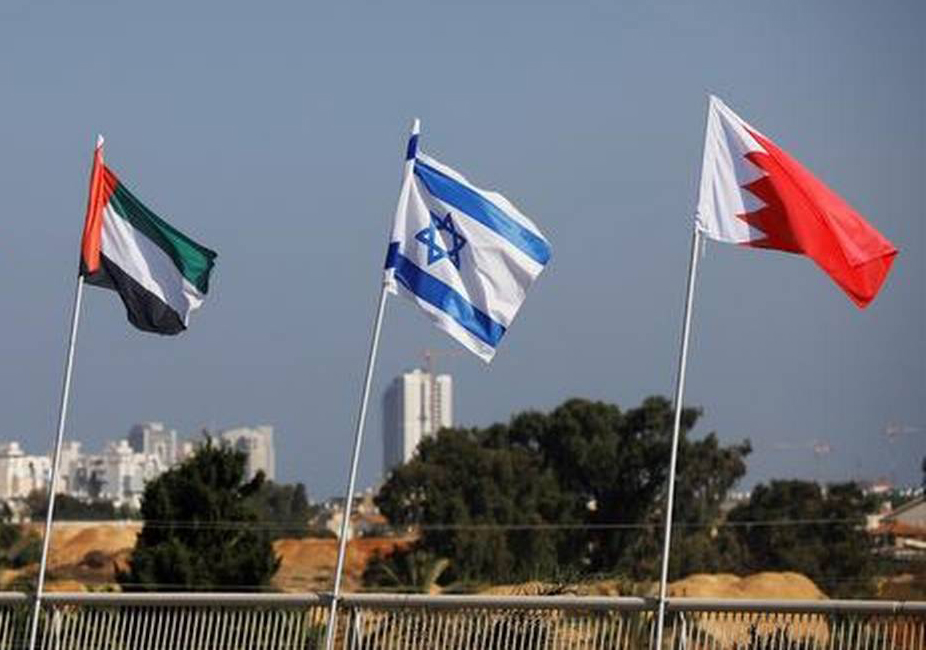IN THE MEDIA
Bridging the gulf to peace
September 15, 2020 | Sharyn Mittelman

Daily Telegraph, Sept. 15 2020
Israel is no longer the hated enemy of the Arab world, as a cascade of peace deals in the Mid-East shows
On September 15, history will be made when Israel and the United Arab Emirates (UAE) sign a peace deal normalising relations at a White House ceremony.
Israel’s Prime Minister Benjamin Netanyahu and Emirati Foreign Minister Abdullah Bin Zayed have both confirmed their attendance at the ceremony — the first such Mideast peace agreement signed in Washington in 26 years.
Meanwhile, it has now been confirmed that Bahrain will also normalise relations with Israel, either signing an agreement at the same ceremony, or at another in the near future.
These agreements will be the culmination of the historic turning point kicked off by the announcement made by the UAE, Israel, and the Trump Administration on August 13 that Jerusalem and Abu Dhabi would be normalising ties.
Weeks of historic firsts have followed — the first Israeli plane to fly to the UAE, the first time an Israeli passenger plane had permission to fly through Saudi Arabian airspace, the first time Israeli, US and UAE officials met openly in Abu Dhabi to progress the peace agreement, and now the Bahraini announcement of normalisation.
The ceremony will be more than just a great photo opportunity for US President Donald Trump but reflects a significant historical shift — many Arab nations no longer view Israel as their enemy, and now recognise the benefits of mutual friendship.
For Israelis, this represents a major step towards fulfilling a long-held dream of peaceful relations with all Israel’s Arab neighbours.
While Israel has peace agreements with Jordan (1994) and Egypt (1979), the UAE and Bahrain agreements will be different in a number of ways.
First, these agreements to normalise ties appear likely to be much “warmer”.
Israel fought wars with both Egypt and Jordan, and peace with them has been mainly about security issues, with little direct people-to people ties.
But Israel has never been at war with UAE or Bahrain and there are no active border disputes to resolve.
Moreover, the deals appear to have public support in all three countries, joint business deals are already taking place, and discussions of direct flights are a top priority.
Second, the deals reflect a broader geopolitical realignment taking place
– an already existing covert alliance of the US, Israel and Sunni Gulf nations against the threat represented by Iran and its proxies including terror group Hezbollah, due to Iran’s nuclear program and its destabilising activities across the region.
With the US pulling back from the region militarily, such an alliance is being seen as more urgent than ever.
Third, the agreement reflects that Arab resistance to “normalisation with Israel” out of solidarity with the Palestinians is no longer the barrier to ties it once was.
Both the UAE and Bahrain say they continue to care about the Palestinian cause, and that the agreement was in the best interests of the Palestinians because it required that Israel suspend its plans to “declare sovereignty” over parts of the West Bank in accordance with the Trump Administration’s peace plan.
In June, the UAE’s Ambassador to the US Yousef Al Otaiba’s wrote an unprecedented op-ed for Israel’s largest Hebrew-language newspaper Yediot Ahronot titled, “It’s Either Annexation or Normalisation.”
A translation stated, “In the UAE and across much of the Arab world, we would like to believe Israel is an opportunity, not an enemy. We face too many common dangers and see the great potential of warmer ties. Israel’s decision on annexation will be an unmistakeable signal of whether it sees it the same way.”
Palestinian leaders say they feel “betrayed” by the deal. Yet there is good reason to believe that Arab states having good ties with Israel will be more effective advocates for the Palestinian cause than those boycotting Israel from afar.
The normalisation announcements did not come out of nowhere, and there have been numerous public acts indicating the development of significant relationships over recent years. Israel established a diplomatic office in Abu Dhabi in 2015, and there have been a number of visits to the UAE by Israeli politicians.
This year the UAE allowed Israel to participate in Expo 2020 in Dubai (now postponed to 2021), and an Israeli cycling team took part in the UAE Tour.
Similarly, Bahrain has also been publicly hosting and meeting with Israeli officials.
Other Arab and Muslim states with warming ties to Israel include Oman, Morocco, Sudan, and Saudi Arabia.
The Saudis are not expected to fully normalise with Israel in the short term, but almost certainly approved the UAE and Bahraini moves, and are quietly very much part of the new alliance system incorporating Israel.
Australia has good relations with all three countries and Foreign Minister Marise Payne has welcomed both normalisation agreements, as have spokespeople for the ALP opposition.
The September 15 ceremony between the UAE and Israel will be the first Middle East White House peace signing in 26 years — but more may soon follow.
This courageous breakthrough has shattered outdated dogma that has prevented more Arab and Muslim states seeking peace with Israel.
The result is likely to be a more peaceful and prosperous Middle East.
Sharyn Mittelman is a Senior Policy Analyst at the Australia/Israel & Jewish Affairs Council (AIJAC).
Tags: Gulf states, Iran, Israel, Middle East





